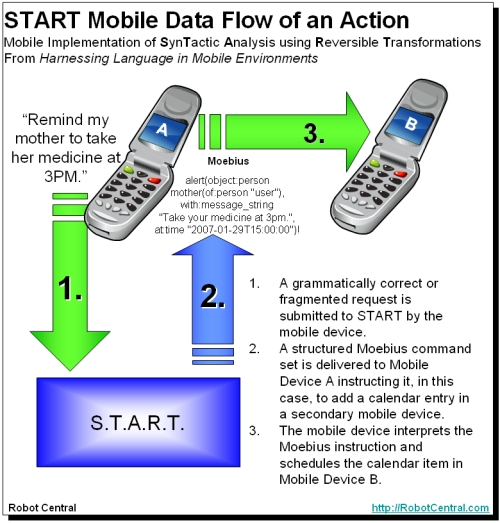The SynTactic Analysis using Reversible Transformations (“START”) system is a super information-finding technology that was developed by Boris Katz and his associates of the InfoLab Group at the MIT Computer Science and Artificial Intelligence Laboratory. It’s a system that’s been running since 1993–long before Google came along.
The system has two syntactic modules: One for learning things and one for answering questions. The learning module is based on START’s ability to parse the English language, annotate it, and store it for later retrieval. Theoretically, START could be pointed to Wikipedia to learn everything that is in there. The catch (for now) is that START requires well-formed English sentences from which to learn.
The retrieval part is what is most impressive. Instead of giving the user a bunch of search results, it provides a highly precise answer:
I asked, “What is a Euro?” START answered,
Noun
- S: (n) euro (the basic monetary unit of most members of the European Union (introduced in 1999); in 2002 twelve European nations (Germany, France, Belgium, Luxembourg, the Netherlands, Italy, Spain, Portugal, Ireland, Greece, Austria, Finland) adopted the euro as their basic unit of money and abandoned their traditional currencies)
Source: WordNet
Perhaps more impressively, START says “I don’t know” when it can’t provide a succinct answer instead of giving me a bunch of useless links that I have to pore through. I asked, “How many feathers in a pound?” To which START responded,
Unfortunately, I don’t know how many feathers there are in a pound.
Finally, I gave it a simple command. I typed in, “Convert 100 dollars to Euros.” START replied,
As of Thursday, April 24, 2008; 11:00:53pm, there are 63.69 Euros in 100 United States Dollars.
Source: XE.com
START was able to perform a basic mathematical operation in this case on the results of the data. It is with this operation that START begins to cross the threshold from super knowledge-finder to a machine-enabling technology.
Katz and his team have developed a prototype system called StartMobile in which the technology is applied to mobile devices. It leverages a knowledge base that is maintained partially on the mobile device and partially on the internet. While the START system on the internet knows a little about Art, Science, Culture, and Geography, StartMobile understands concepts of a mobile device such as calendar, contacts, camera, settings, and so on. This knowledge allows the user to make commands like, “Take a high-res picture using the flash in 10 seconds.”
In a more advanced scenario, StartMobile was told, “Remind my mother to take her medicine at 3PM.” The device was able to understand who “my mother” is, what “remind” means, and the implication that the method to remind my mother is to create a reminder in my mother’s cell phone. It contrived a sentence for her reminder that reads “Take your medicine at 3pm” changing “her” to “your.” Here’s rendering of the flow:
This project is supported in part by Nokia which is a good investment on Nokia’s part. StartMobile is a prime and marketable candidate for licensing by vendors to place into everyday things like cars, phones, and computers and into not so everyday things like robots. The ability to understand and apply natural language reduces the friction of mainstream personal robot adoption by helping them to successfully interact with humans. Here we see a bridge that connects the two.
—
Boris Katz is a Principal Research Scientist and Head of the InfoLab Group at MIT’s Computer Science and Artificial Intelligence Laboratory. His research interests include natural language understanding and generation, intelligent multimedia information access, knowledge representation, human computer interaction, and machine learning. He has authored more than 50 publications and 2 U.S. Patents.
Source:




I gave this a try as a good search engine is nice to know about. While it seems to perform well, it falls down quickly.
How deep is the Baltic sea? got a decent answer but the question “what is the salinity of the Baltic sea? got no answer. In Google “salinity Baltic sea” brought a page of answers including 3.5% in the summary of the top answer from Wikipedia.
I tried a few others and got better results with Google. The results I saw with Baltic sea salinity is the kind of results I got searching for gross domestic product of Missouri.
I’m not an average user but I can’t see any reason to switch from Google to Start. I’ve been interested in this kind of search tool for a long time as much of what we think about computers and robots in science fiction can be laid over a framework of Internet search engines. The amount of knowledge in the Internet exceeds what most of us can keep in our heads such that it could form the basis of a group of memories for a robot. Unfortunately, I don’t think that MIT has a complete answer yet. Straight out of the box I found two failures. “I don’t know” is not acceptable when the query included enough information for Google to get the right answer in the first result.
I hope that they are able to improve this search, and I’ll continue to watch it.